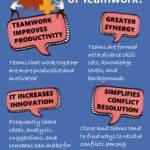
How to Develop a Group Mindset?
Set-piece team building exercises are one way to strengthen the bonds within your team, but they are not a shortcut to success. Instead, you should make team building part of a larger learning process so that your team can develop a group mindset.
Think about the team building potential of routine workplace activities, first. Then, use the following four strategies to develop your team’s strength, cohesiveness and effectiveness day to day.
Get to Know Your Team
Your team is made up of people with different needs, ambitions and personalities. Getting to know them, and helping them to get to know each other, can build a happy, trusting team.
Hosting a pre-holiday drinks evening or even an inexpensive team barbeque, for example, are easy ways to start to get your team members mixing and mingling.
Attending social events is a great way to build relationships. People will more likely open up and reveal more of their personalities in a relaxed setting.
Also, research has shown that sharing aspects of your personal life increases your likability, as it shows others that you can be an empathic, compassionate and authentic manager.
Work Toward a Common Goal
You can unite your people by inspiring them to get behind a shared vision or goal. Having a clearly identified destination can prevent individuals from pulling in different directions, which is frustrating and ineffective.
Creating a Team Charter can provide your people with a written definition of the team’s purpose and goals.
Develop Strong Team Skills
Your team needs to develop the right skills and competencies to achieve its goals. A skills matrix is a solid starting point for doing this.
Use the matrix to audit your team members’ abilities and training needs, and to match their skills to specific roles.
Developing stronger skill sets, and matching your people to the roles best suited to them, can result in a more able, more motivated team.
Connect With a Virtual Team
Chances are, as more and more people work remotely, you could find yourself managing a virtual team. It can be hard to build rapport among team members who never, or rarely, meet face-to-face.
Time zones and cultural differences can present additional challenges when considering team building activities or strategies for remote teams.
Your remote team members might feel isolated from their colleagues, so they will likely welcome opportunities for socializing “virtually,” improving their skills, and having fun, too!
It is possible to stay in regular and effective communication with virtual team members, given the wide range of online tools that are available. However, the key to building an effective team lies more in how its members communicate than in the technology they use.


